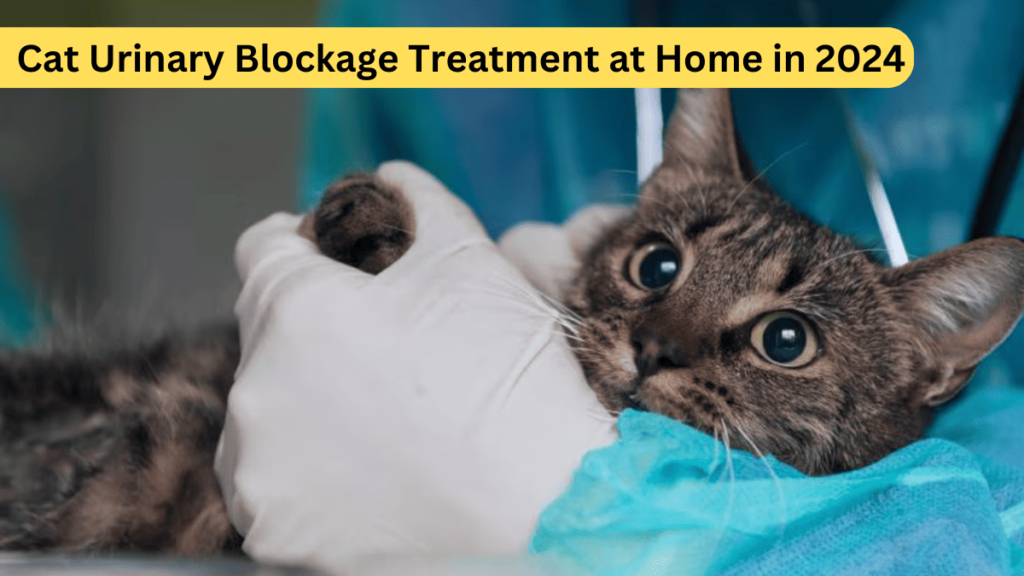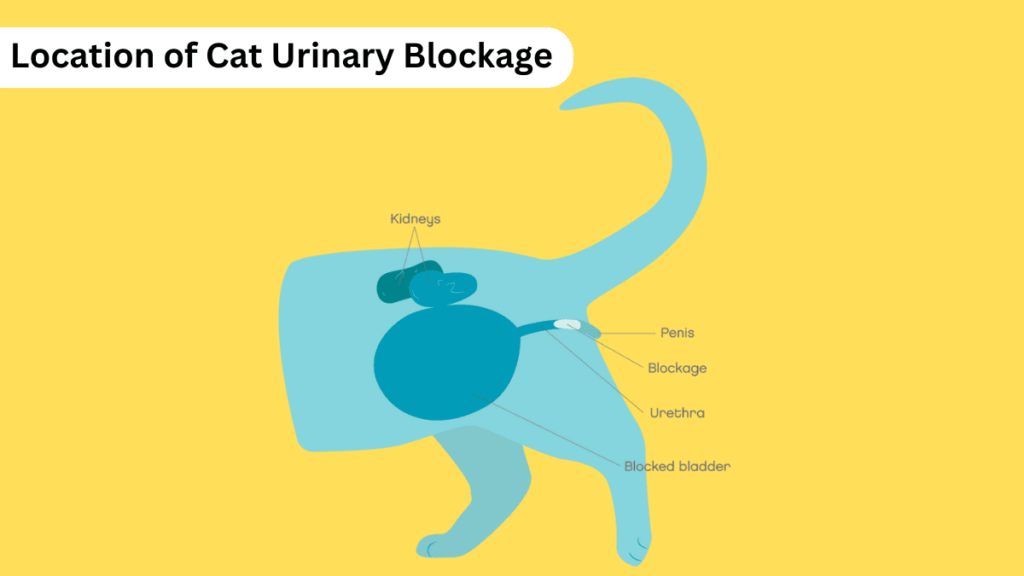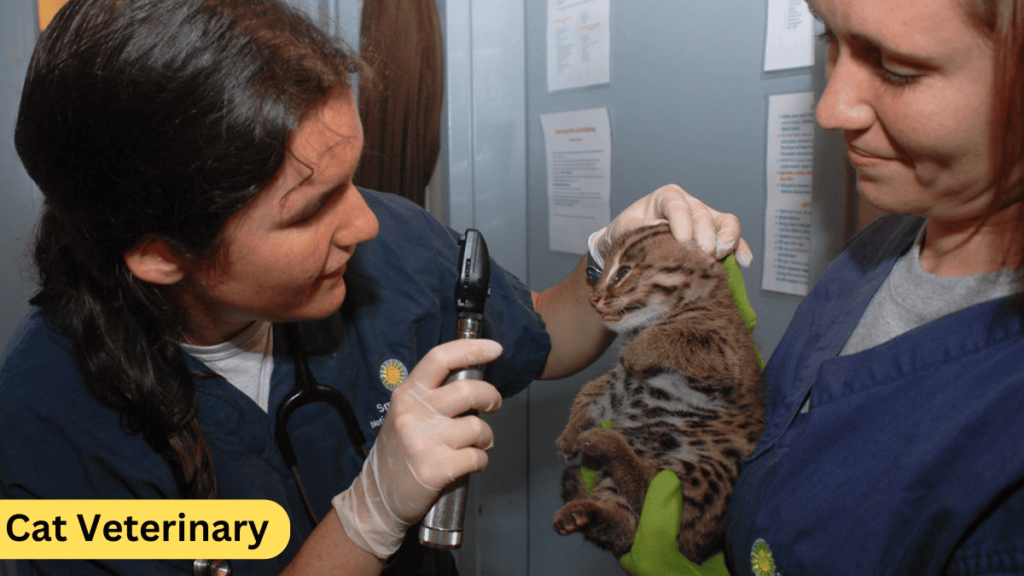
Urinary blockages in cats can be life-threatening, and while immediate veterinary care is essential in severe cases, understanding home treatments and preventive measures can help manage mild symptoms or prevent recurrence. This article provides a detailed guide on Cat Urinary Blockage Treatment at Home in 2024 and remedies for urinary tract infections (UTIs) in cats.
Table of Contents
What is Cat Urinary Blockage?

Cat urinary blockage, or urethral obstruction, occurs when the urethra, the tube that carries urine from the bladder, becomes partially or completely blocked. Male cats are particularly susceptible due to their narrower urethras, and the blockage can result from bladder stones, crystals, or inflammation.
Signs of a Urinary Blockage in Cats:
- Frequent attempts to urinate with little or no urine output
- Straining in the litter box
- Crying out in pain
- Blood in the urine
- Lethargy or hiding
- Vomiting
If your cat shows any of these signs, immediate veterinary care is required. Home treatments can supplement professional care, but severe cases need urgent attention to prevent kidney failure or death.
Can You Treat Cat Urinary Blockage at Home?
In mild cases or as preventive care, certain steps can help manage cat urinary issues at home. However, for severe blockages, a veterinarian must be consulted.
Home Treatments for Cat Urinary Blockages:
- Hydration is Key Cats prone to urinary blockages need plenty of water to flush the urinary tract and reduce the formation of crystals. You can increase water intake by:
- Providing fresh water daily
- Using cat fountains, which encourage drinking
- Mixing water with wet food
- Offering low-sodium chicken or bone broth (ensure it’s free from onion or garlic)
- Wet Food Diet Dry kibble can dehydrate cats, making them more prone to urinary issues. Switch to high-quality canned food that is formulated to support urinary health. Look for foods with higher moisture content and lower levels of magnesium and phosphorus.
- Apple Cider Vinegar A small amount of apple cider vinegar can help dissolve crystals and prevent the formation of new ones. You can mix 1/4 teaspoon into your cat’s water or food daily. However, consult with your vet before using this remedy to ensure it’s safe for your cat.
- Cranberry Supplements Cranberry extract or cranberry-based supplements can help maintain the urinary tract’s health and prevent bacterial infections. This can be especially helpful in cats prone to urinary tract infections.
- Stress Reduction Stress is a known factor in feline lower urinary tract disease (FLUTD). Use calming sprays, diffusers, or supplements like L-theanine to keep your cat relaxed. Providing a safe, quiet environment with plenty of stimulation can also reduce stress.
- Litter Box Hygiene Keeping the litter box clean is essential. A dirty litter box can cause your cat to hold urine, which increases the risk of urinary issues. Scoop the box daily, and ensure there are enough litter boxes for each cat in the household.
- D-Mannose D-Mannose is a natural sugar that can prevent bacteria from sticking to the walls of the urinary tract. It’s safe for cats and can be added to their water or food after consulting with your vet.
- Herbal Remedies Herbs like Uva Ursi, Marshmallow Root, and Cornsilk have been traditionally used to treat urinary issues in cats. These can soothe inflammation and support the urinary system. Always discuss herbal treatments with your vet before administering them.
Home Remedies for Cat Urinary Tract Infection (UTI)
Cat urinary tract infections (UTIs) are often confused with urinary blockages but involve bacterial infections in the bladder. These infections can sometimes be managed at home with natural remedies, but a vet visit is essential to determine the underlying cause.
Cat Urinary Tract Infection Home Remedies:
- Increased Water Intake Just as with urinary blockages, hydration is key to flushing out bacteria. Ensure your cat is drinking more water to dilute the urine and clear the infection faster.
- Cranberry Juice Cranberry juice can acidify the urine and prevent bacteria from adhering to the bladder walls. Look for a supplement specifically designed for cats or mix a small amount of pure cranberry juice with their water.
- Probiotics Probiotics support overall digestive and immune health, which can help prevent and manage UTIs. Look for veterinary-approved probiotic supplements to mix into your cat’s food.
- Apple Cider Vinegar Apple cider vinegar can be an effective home remedy for UTI in cats. Dilute 1/4 teaspoon of apple cider vinegar in your cat’s water or food. It helps restore the pH balance in the bladder, making it harder for bacteria to thrive.
- Dietary Changes Feeding your cat a urinary health-focused diet can help prevent future UTIs. Look for commercial cat foods designed to maintain urinary health, typically with lower mineral content that reduces crystal and stone formation.
Preventing Urinary Blockages and UTIs in Cats
Prevention is key to avoiding future urinary blockages or UTIs. Here are several ways to keep your cat’s urinary tract healthy:
- Promote Hydration: Use fountains and wet food to increase water intake.
- Regular Vet Checkups: Routine checkups can help detect urinary issues before they become severe.
- Manage Weight: Overweight cats are more prone to urinary problems, so keep your cat at a healthy weight with appropriate diet and exercise.
- Stress Reduction: Create a calm and stimulating environment for your cat to reduce stress-related urinary issues.
When to See a Vet

While home remedies can help manage minor urinary issues, immediate veterinary care is needed if:
- Your cat is unable to urinate
- There’s blood in their urine
- They are straining in the litter box
- They are vomiting, lethargic, or crying out in pain
A urinary blockage is a medical emergency, and home treatment is not sufficient if the symptoms are severe.
Read More:
Miliary Dermatitis in Cats Home Treatment: A 2024 Guide
Natural Worm Treatment for Cats: A 2024 Guide
Table: Home Treatments for Cat Urinary Blockage and UTI
| Treatment | Purpose | How to Use |
|---|---|---|
| Hydration (water, broth) | Flushes urinary system, prevents stones | Ensure constant access to fresh water, add broth to meals |
| Wet Food | Prevents dehydration | Switch from dry food to canned food with high moisture |
| Apple Cider Vinegar | Dissolves crystals, prevents infections | Mix 1/4 tsp in water or food (with vet approval) |
| Cranberry Supplements | Supports urinary health, prevents UTI | Administer according to supplement instructions |
| Stress Reduction | Prevents stress-induced urinary issues | Use calming sprays, supplements, or safe spaces |
| D-Mannose | Prevents bacterial adherence | Mix with food or water (with vet approval) |
| Probiotics | Boosts immune system | Add to food daily |
| Clean Litter Box | Reduces risk of infection | Scoop daily, clean weekly |
FAQs
Q: Can I use cat urinary blockage treatment at home without going to the vet? A: No, severe cases of urinary blockage require immediate veterinary intervention. Home treatments can help prevent future issues but are not a substitute for medical care.
Q: Are there home remedies for cat urinary tract infections? A: Yes, remedies like increased water intake, cranberry supplements, apple cider vinegar, and probiotics can help, but a vet should still be consulted to confirm the diagnosis.
Q: How can I prevent urinary blockages in my cat? A: Encourage hydration, switch to a wet food diet, manage stress, and ensure regular vet checkups to prevent blockages from forming.
